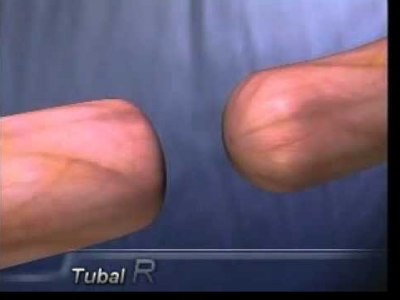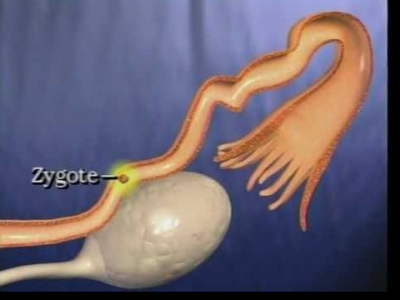Causes of ectopic pregnancy
After fertilization, the embryo descends through the fallopian tubes, where the ovule-sperm junction has reached the uterus and implanted in the endometrium to give rise to the clutch. When the embryo implantation occurs in a place other than the endometrium, ectopic pregnancy occurs.
Below you have an index with all the points that we will discuss in this article.
Index
Causes of ectopic pregnancyThe most common cause for which an ectopic pregnancy is usually given is a malformation, narrowing or obstruction of one of the fallopian tubes, which prevents the embryo from descending and making its normal route to the uterus.
Factors that cause ectopic pregnancyAlthough this is the most common, there are other factors that can influence the appearance of ectopic pregnancy, such as:
- Smoking The risk of ectopic pregnancy is multiplied by 2 when the woman smokes more than 20 cigarettes a day. This risk is due to the toxic effect that nicotine exerts on the tubal environment.
- The use of certain contraceptives . The contraceptive pills contain hormones like progesterone and estrogens that can slow the passage of the embryo through the fallopian tubes, favoring the implantation in them.
Also the intrauterine contraceptive device (IUD) can increase the risk of getting a pelvic infection or cause inflammation of the tubes, and indirectly increase the risk of ectopic pregnancy.
In the IUDs that release progesterone, like the contraceptive pills, it is known that this hormone can cause a slower movement of the embryo through the tubes.
- Pelvic inflammatory disease (PID), also known as salpingitis , occurs with inflammation of the pelvic structures, uterus, and fallopian tubes. This can cause a mechanical impediment in the passage of the embryo to the uterus leading to ectopic pregnancy.
PID can be caused by a sexually transmitted disease. The most well-known causative agent is a type of Chlamydia, Chlamydia trachomatis.
In 50% of ectopic pregnancies there is this clinical history. The detailed study of the woman and the personal situation of each pregnancy is very important to determine the cause or causes and prevent it from happening again.
Risk factor's
Among the risk factors that can lead to ectopic pregnancy, we highlight:
- Endometriosis: is the growth of endometrial tissue outside the uterus, in other parts of the body. This can cause a tuboperitoneal alteration, that is, an alteration in the tubes or in the tube-ovarian space. Risk factors of ectopic pregnancy
- The hormonal imbalances caused by the antiestrogenic action of clomiphene citrate in the ovulation induction treatments. These drugs can cause alterations in tubal motility.
- The existence of previous ectopic pregnancies multiplies between 7 and 10 the risk of having a new ectopic pregnancy. Although it is true that this factor is generally associated with others.
- Tubal ligation or subsequent tubal recanalization may increase the risk of suffering an ectopic pregnancy, as well as other operations such as appendectomy, which may lead to the development of peritoneal adhesions.

Ectopic pregnancy by IVF
It must also be borne in mind that the development of assisted reproduction techniques implies the appearance of a new risk factor for ectopic pregnancy.
If we focus on ectopic pregnancies caused by assisted reproduction techniques, specifically in vitro fertilization, either through conventional IVF or ICSI (intracytoplasmic embryo injection), it should be noted that the cause for which embryos can go outside of the uterine cavity and implant elsewhere is partly due to the embryo transfer technique itself.
In this sense factors such as the volume of fluid that is transferred, the location of the transfer cannula in the uterine fundus, uterine manipulation, specialist experience, etc.

Comments
Post a Comment